初中英语疑问句
初中英语疑问句讲解
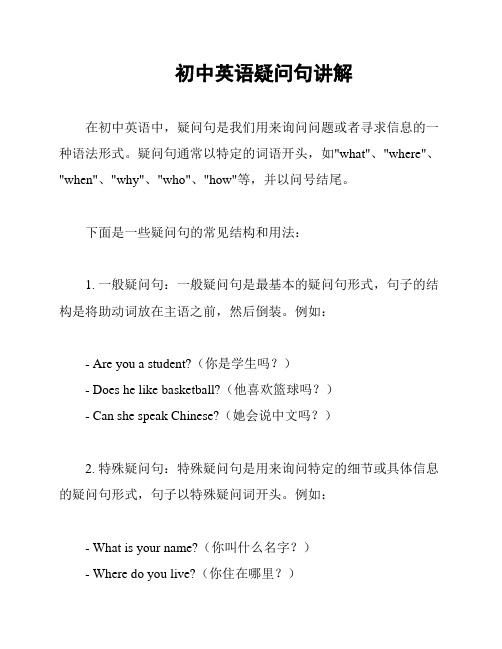
初中英语疑问句讲解在初中英语中,疑问句是我们用来询问问题或者寻求信息的一种语法形式。
疑问句通常以特定的词语开头,如"what"、"where"、"when"、"why"、"who"、"how"等,并以问号结尾。
下面是一些疑问句的常见结构和用法:1. 一般疑问句:一般疑问句是最基本的疑问句形式,句子的结构是将助动词放在主语之前,然后倒装。
例如:- Are you a student?(你是学生吗?)- Does he like basketball?(他喜欢篮球吗?)- Can she speak Chinese?(她会说中文吗?)2. 特殊疑问句:特殊疑问句是用来询问特定的细节或具体信息的疑问句形式,句子以特殊疑问词开头。
例如:- What is your name?(你叫什么名字?)- Where do you live?(你住在哪里?)- When is the party?(派对是什么时候?)- Why did she cry?(她为什么哭了?)- How did they win the game?(他们是如何赢得比赛的?)3. 选择疑问句:选择疑问句是用来在两个或多个选项之间做出选择的疑问句形式。
句子以"or"连接不同的选项。
例如:- Do you want coffee or tea?(你想要咖啡还是茶?)- Are you going by car or by bus?(你是坐车还是坐公交?)4. 否定疑问句:否定疑问句是用来提出带有否定意义的问题的疑问句形式。
句子通常以"don't"或"doesn't"开头。
例如:- Don't you like pizza?(你不喜欢比萨吗?)- Doesn't she have a dog?(她没有狗吗?)总结:初中英语中的疑问句结构和用法有多种类型,包括一般疑问句、特殊疑问句、选择疑问句和否定疑问句。
初中英语疑问句、祈使句、感叹句(39张)

door? -- As soon as I entered the room.
A.What B.When C.Where D.Why
4.--_C__ did Mr. Wang leave in a hurry?
2. 当must表示“必须”时,反意疑问部分用 mustn’t.
You must work harder next term, mustn’t you?
3. 当must表示“必要”时,反意疑问部分用 needn’t.
You must go home right now, needn’t you? 陈述句中有mustn’t(表示“禁止”)时, 反意疑问部分用must.
“疑问词+一般疑问句”
1.—_C___ schoolbag is this?
--I guess it’s Lily’s.
A.What B. Who C. Whose D. Which
2.--_A__ will tБайду номын сангаасe supper be ready? I’m hungry.
-- In a minute. A.How soon B.How long C.How much D.How often
一般疑问句特殊疑问句选择疑问句反意疑问句一般疑问句一般疑问句是表示询问事物或某种情况是否属实需要用来回答读时用升调
疑问句
你知道疑问句有几种吗?
一般疑问句、特殊疑问句、选择 疑问句、反意疑问句
一般疑问句
一般疑问句是表示询问事物或某种情况是 否属实,需要用_y_e_s__/ _n_o__来回答,读时 用升调。一般疑问句和陈述句之间存在着 一定的转换关系。
初中英语知识点:陈述句和疑问句

中考英语陈述句和疑问句用法一、基本概念陈述句是陈述一个事实或者说话人的看法。
它包括肯定句和否定句两种。
陈述句在书写时句末用句号,在朗读时用降调。
疑问句是用来提问的句子,句末用问号。
疑问句分为一般疑问句,特殊疑问句,选择疑问句和反义疑问句。
二、基本分类陈述句肯定句疑问句一般疑问句特殊疑问句选择疑问句否定句反义疑问句三、用法详解1、否定句1)一看句中是否有be 动词(am,is are,was,were),如果有在其后加not, 并把原句中的some 改为any。
例如:She is reading a book.---She is not reading a book.There are some apples on the tree.—There are not any (=no ) apples on the tree.2)二看句中是否有情态动词:(can ,could, may, must, will, would, should等)变化如同一中说,not 仍然放在后。
例如:I can ride a bike.---I can not (=can’t) ride a book.We will hold a sports meeting next Sunday.----We will not (=won’t) hold a sports meeting next Sunday.3)三看句中是否有助动词:(have, has, had),变化如同前两说,not仍然放其后。
例如:We have finished the task.----We haven’t finished the task.4)四变否定却看无,句中只有行为动(词),要提助动来完成。
(don’t, doesn’t, didn’t)例如:(1)I want a new bike.--I don’t want a new bike.(2)He wrote a letter to his pen-friend yesterday.--He didn’t write a letter to his pen-friend yesterday.(3)She always takes good care of her patients. --She doesn’t always take good care of her patients.当借助doesn’t和didn’t 构成否定后,行为动词要还原为原形。
初中英语疑问句的构成及用法归纳大全
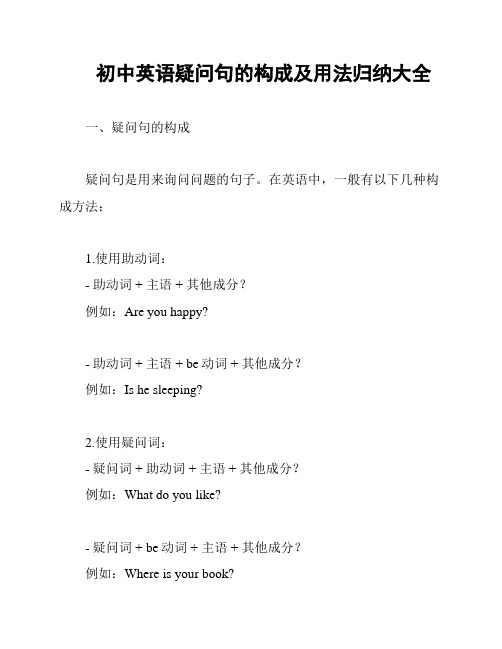
初中英语疑问句的构成及用法归纳大全一、疑问句的构成疑问句是用来询问问题的句子。
在英语中,一般有以下几种构成方法:1.使用助动词:- 助动词 + 主语 + 其他成分?例如:Are you happy?- 助动词 + 主语 + be动词 + 其他成分?例如:Is he sleeping?2.使用疑问词:- 疑问词 + 助动词 + 主语 + 其他成分?例如:What do you like?- 疑问词 + be动词 + 主语 + 其他成分?例如:Where is your book?3.使用倒装句:- 倒装助动词 + 主语 + 谓语?例如:Can he swim?- 倒装be动词 + 主语?例如:Is she a teacher?二、常见疑问词的用法疑问词是用来引导疑问句的特殊词汇。
以下是一些常见的疑问词及其用法:1. Who:询问人的身份、特征等例如:Who is your best friend?2. What:询问事物、事实、性质等例如:What is your favorite color?3. Where:询问地点或位置例如:Where do you live?4. When:询问时间或日期例如:When is your birthday?5. Why:询问原因或目的例如:Why are you crying?6. How:询问方式、方式、程度等例如:How do you go to school?三、特殊疑问句的构成特殊疑问句是由疑问词引导的疑问句,对整个句子提问。
按照特殊疑问词的不同,构成方法也有所区别:1. 对主语提问:- 疑问词 +be动词 + 主语 + 其他成分?例如:Who is the best student in the class?2. 对宾语提问:- 疑问词 + 助动词 + 主语 + 动词 + 其他成分?例如:What does he like to eat?3. 对地点、时间、原因等提问:- 疑问词 + 助动词 + 主语 + 谓语 + 其他成分?例如:Where did you go last weekend?四、陈述句转换为疑问句将陈述句转换为疑问句时,可以通过改变语序或添加助动词来完成。
初中英语知识点归纳疑问句的构成与转换
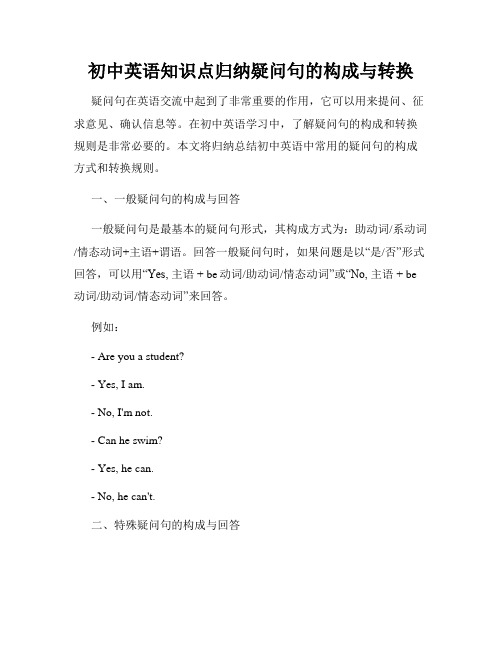
初中英语知识点归纳疑问句的构成与转换疑问句在英语交流中起到了非常重要的作用,它可以用来提问、征求意见、确认信息等。
在初中英语学习中,了解疑问句的构成和转换规则是非常必要的。
本文将归纳总结初中英语中常用的疑问句的构成方式和转换规则。
一、一般疑问句的构成与回答一般疑问句是最基本的疑问句形式,其构成方式为:助动词/系动词/情态动词+主语+谓语。
回答一般疑问句时,如果问题是以“是/否”形式回答,可以用“Yes, 主语 + be动词/助动词/情态动词”或“No, 主语 + be 动词/助动词/情态动词”来回答。
例如:- Are you a student?- Yes, I am.- No, I'm not.- Can he swim?- Yes, he can.- No, he can't.二、特殊疑问句的构成与回答特殊疑问句用于询问某个具体的信息,其构成方式为:特殊疑问词+一般疑问句的构成规则。
我们常用的特殊疑问词有:who, what, where, when, why, how等。
例如:- What is your name?- My name is John.- Where do you live?- I live in Beijing.- When is your birthday?- My birthday is on November 10th.- Why are you late?- Because there was traffic jam.- How do you go to school?- I go to school by bus.三、选择疑问句的构成与回答选择疑问句用于提供选项,并询问对方在这些选项中做出选择。
其构成方式为:疑问词+助动词/情态动词+主语+谓语+其他信息。
例如:- Which color do you like, red or blue?- I like blue.- Do you want tea or coffee?- I want coffee.四、反义疑问句的构成与回答反义疑问句用于提出对原句的肯定或否定的相反意见,并询问对方是否同意。
初中英语疑问句知识点
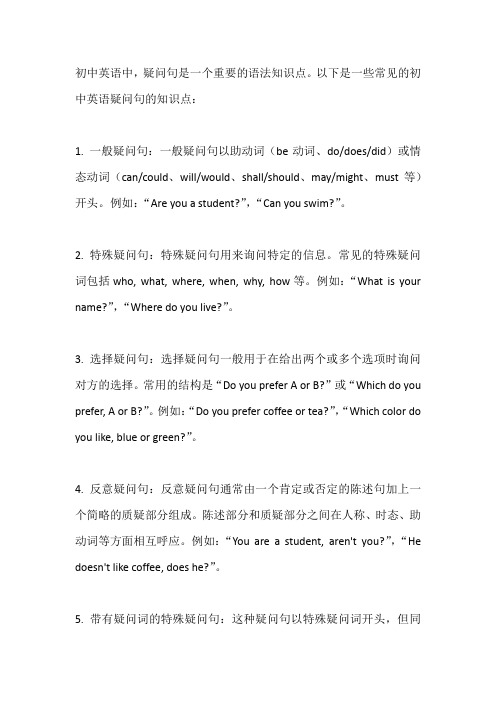
初中英语中,疑问句是一个重要的语法知识点。
以下是一些常见的初中英语疑问句的知识点:1. 一般疑问句:一般疑问句以助动词(be动词、do/does/did)或情态动词(can/could、will/would、shall/should、may/might、must等)开头。
例如:“Are you a student?”,“Can you swim?”。
2. 特殊疑问句:特殊疑问句用来询问特定的信息。
常见的特殊疑问词包括who, what, where, when, why, how等。
例如:“What is your name?”,“Where do you live?”。
3. 选择疑问句:选择疑问句一般用于在给出两个或多个选项时询问对方的选择。
常用的结构是“Do you prefer A or B?”或“Which do you prefer, A or B?”。
例如:“Do you prefer coffee or tea?”,“Which color do you like, blue or green?”。
4. 反意疑问句:反意疑问句通常由一个肯定或否定的陈述句加上一个简略的质疑部分组成。
陈述部分和质疑部分之间在人称、时态、助动词等方面相互呼应。
例如:“You are a student, aren't you?”,“He doesn't like coffee, does he?”。
5. 带有疑问词的特殊疑问句:这种疑问句以特殊疑问词开头,但同时也包含了一般疑问句的结构。
例如:“What time do you usually get up?”,“How often do you exercise?”。
学生在学习疑问句时需要注意以下几点:-疑问句的变换方式,如将陈述句转换为一般疑问句、特殊疑问句等;-特殊疑问词的使用及其不同的含义和用法;-语序的变化,特别是特殊疑问句中主语和谓语的位置变化。
初中英语知识点归纳常见的疑问词和疑问句型
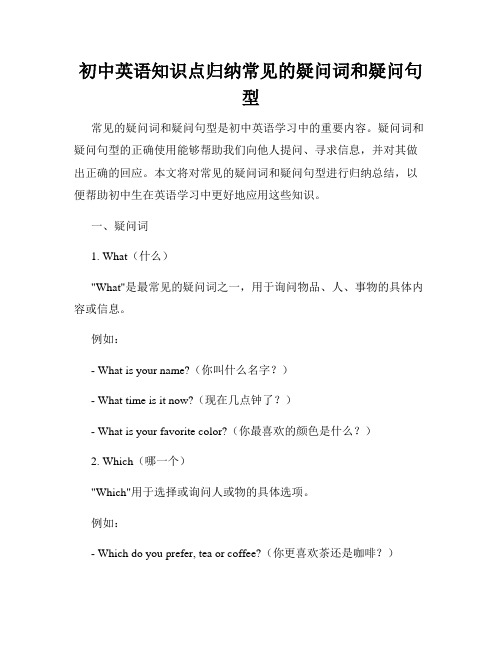
初中英语知识点归纳常见的疑问词和疑问句型常见的疑问词和疑问句型是初中英语学习中的重要内容。
疑问词和疑问句型的正确使用能够帮助我们向他人提问、寻求信息,并对其做出正确的回应。
本文将对常见的疑问词和疑问句型进行归纳总结,以便帮助初中生在英语学习中更好地应用这些知识。
一、疑问词1. What(什么)"What"是最常见的疑问词之一,用于询问物品、人、事物的具体内容或信息。
例如:- What is your name?(你叫什么名字?)- What time is it now?(现在几点钟了?)- What is your favorite color?(你最喜欢的颜色是什么?)2. Which(哪一个)"Which"用于选择或询问人或物的具体选项。
例如:- Which do you prefer, tea or coffee?(你更喜欢茶还是咖啡?)- Which book do you want to borrow?(你想借哪本书?)- Which team won the match?(哪个队赢得了比赛?)3. Who(谁)"Who"用于询问人的身份或者对特定人的具体了解。
例如:- Who is your best friend?(你最好的朋友是谁?)- Who won the competition?(谁赢得了比赛?)- Who is the president of the country?(国家的总统是谁?)4. Whose(谁的)"Whose"用于询问所有权。
例如:- Whose book is this?(这本书是谁的?)- Whose pen did you borrow?(你借了谁的钢笔?)- Whose turn is it to clean the classroom?(该轮到谁来打扫教室了?)5. When(什么时候)"When"用于询问时间、日期或事件发生的具体时间。
初中英语知识点归纳疑问句和反意疑问句的用法
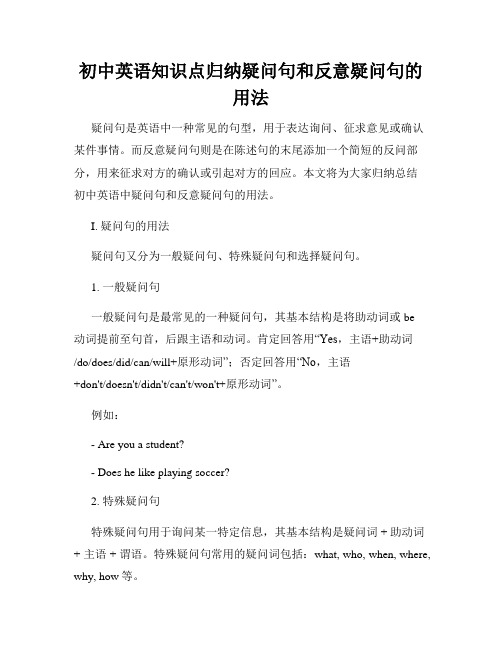
初中英语知识点归纳疑问句和反意疑问句的用法疑问句是英语中一种常见的句型,用于表达询问、征求意见或确认某件事情。
而反意疑问句则是在陈述句的末尾添加一个简短的反问部分,用来征求对方的确认或引起对方的回应。
本文将为大家归纳总结初中英语中疑问句和反意疑问句的用法。
I. 疑问句的用法疑问句又分为一般疑问句、特殊疑问句和选择疑问句。
1. 一般疑问句一般疑问句是最常见的一种疑问句,其基本结构是将助动词或be动词提前至句首,后跟主语和动词。
肯定回答用“Yes,主语+助动词/do/does/did/can/will+原形动词”;否定回答用“No,主语+don't/doesn't/didn't/can't/won't+原形动词”。
例如:- Are you a student?- Does he like playing soccer?2. 特殊疑问句特殊疑问句用于询问某一特定信息,其基本结构是疑问词 + 助动词+ 主语 + 谓语。
特殊疑问句常用的疑问词包括:what, who, when, where, why, how等。
例如:- What is your name?- Where do you live?3. 选择疑问句选择疑问句用于提供选择的问题,其基本结构是“Or”连接两个陈述句。
其中,前一陈述句用正语序,后一陈述句用部分倒装语序。
回答选择疑问句时,可以根据实际情况选择其中一个选项进行回答。
例如:- Would you like tea or coffee?- Do you prefer basketball or football?II. 反意疑问句的用法反意疑问句用于在陈述句的末尾添加反问部分,并且正反之间一般存在意义上的对立或前后关系。
基本结构为:陈述句,正反疑问句。
1. 使用助动词当陈述句中有助动词时,反意疑问句一般使用助动词的缩略形式。
例如:- You can swim, can't you?- He likes playing tennis, doesn't he?2. 使用be动词当陈述句中是be动词时,反意疑问句中使用do作为辅助动词。
初中英语疑问句一般疑问句特殊疑问句
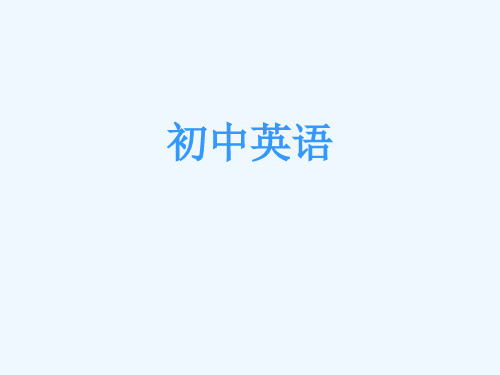
1. I like English. Do you like English
2. Eddie played football. Did Eddie play football
一般疑问句的肯定回答、否定回答。
肯定回答:Yes,… +关键词。 否定回答:No,…+关键词+not.
8.I’ll bring it here in a minute.
How soon will you bring it here
Exercises :针对下列划线部分提问
• 1.We are going to Hainan Island. Where are you going
• 2.Chinese New Year this year is in February. When is Chinese New Year
Susan: _S_o_m__e_ of them are from Lianhua Supermarket and _s_o_m__e_ from Xixi shop.
Tom: Could you buy _s_o_m__e_ for me I also need s_o_m__e__
but I am very busy today.
想想还缺了哪个疑问词呢
Let’s see the family of “how”
1. I go to school by bus.
How do you go to school
2. She is twelve.
How old is she
3. Jim plays with his dog for about two hours on Sunday.
初中英语句子之疑问句
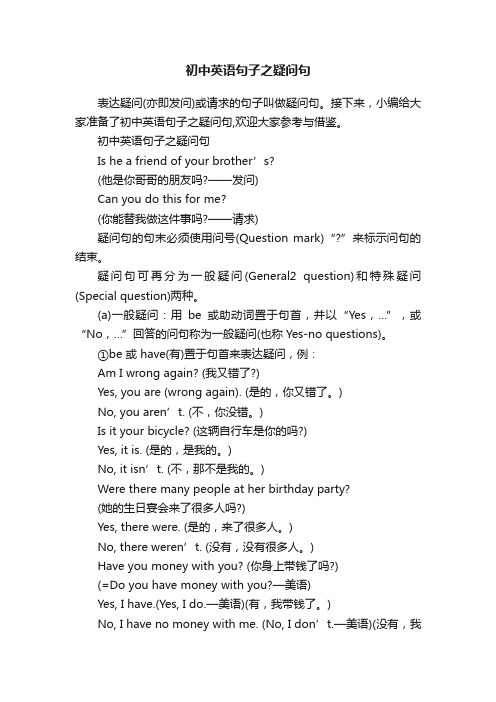
初中英语句子之疑问句表达疑问(亦即发问)或请求的句子叫做疑问句。
接下来,小编给大家准备了初中英语句子之疑问句,欢迎大家参考与借鉴。
初中英语句子之疑问句Is he a friend of your brother’s?(他是你哥哥的朋友吗?——发问)Can you do this for me?(你能替我做这件事吗?——请求)疑问句的句末必须使用问号(Question mark)“?”来标示问句的结束。
疑问句可再分为一般疑问(General2 question)和特殊疑问(Special question)两种。
(a)一般疑问:用be或助动词置于句首,并以“Yes,…”,或“No,…”回答的问句称为一般疑问(也称Yes-no questions)。
①be 或 have(有)置于句首来表达疑问,例:Am I wrong again? (我又错了?)Yes, you are (wrong again). (是的,你又错了。
)No, you ar en’t. (不,你没错。
)Is it your bicycle? (这辆自行车是你的吗?)Yes, it is. (是的,是我的。
)No, it isn’t. (不,那不是我的。
)Were there many people at her birthday party?(她的生日宴会来了很多人吗?)Yes, there were. (是的,来了很多人。
)No, there weren’t. (没有,没有很多人。
)Have you money with you? (你身上带钱了吗?)(=Do you have money with you?—美语)Yes, I have.(Yes, I do.—美语)(有,我带钱了。
)No, I have no money with me. (No, I don’t.—美语)(没有,我没带钱。
)②助动词置于句首来表达疑问,例:Shall3 I call a taxi for you ? (需要我替你叫一辆出租车吗?)Yes, please. Thank you. (好的,谢谢你。
初中英语疑问句型
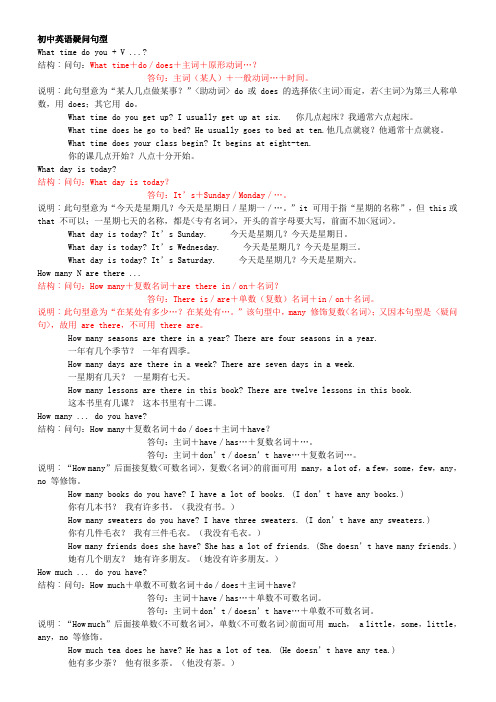
初中英语疑问句型What time do you + V ...?结构︰问句:What time+do/does+主词+原形动词…?答句:主词(某人)+一般动词…+时间。
说明︰此句型意为“某人几点做某事?”<助动词> do 或 does 的选择依<主词>而定,若<主词>为第三人称单数,用 does;其它用 do。
What time do you get up? I usually get up at six. 你几点起床?我通常六点起床。
What time does he go to bed? He usually goes to bed at ten.他几点就寝?他通常十点就寝。
What time does your class begin? It begins at eight-ten.你的课几点开始?八点十分开始。
What day is today?结构︰问句:What day is today?答句:It’s+Sunday/Monday/…。
说明︰此句型意为“今天是星期几?今天是星期日/星期一/…。
”it 可用于指“星期的名称”,但 this或that 不可以;一星期七天的名称,都是<专有名词>,开头的首字母要大写,前面不加<冠词>。
What day is today? It’s Sunday.今天是星期几?今天是星期日。
What day is today? It’s Wednesday.今天是星期几?今天是星期三。
What day is today? It’s Saturday.今天是星期几?今天是星期六。
How many N are there ...结构︰问句:How many+复数名词+are there in/on+名词?答句:There is/are+单数(复数)名词+in/on+名词。
说明︰此句型意为“在某处有多少…?在某处有…。
初中英语 疑问句
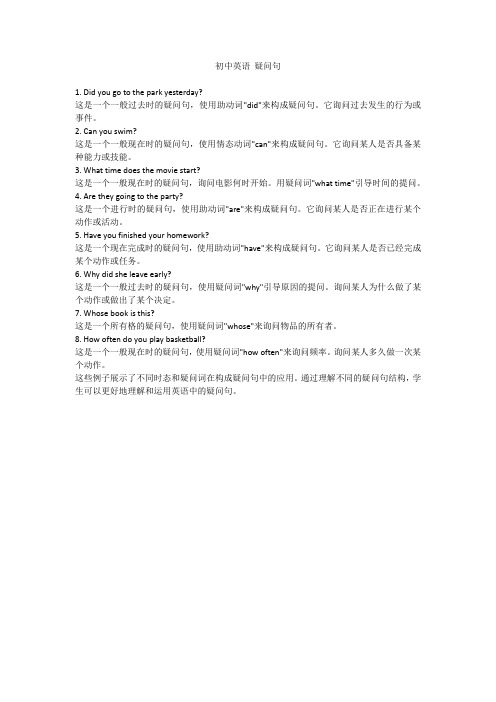
初中英语疑问句1. Did you go to the park yesterday?这是一个一般过去时的疑问句,使用助动词"did"来构成疑问句。
它询问过去发生的行为或事件。
2. Can you swim?这是一个一般现在时的疑问句,使用情态动词"can"来构成疑问句。
它询问某人是否具备某种能力或技能。
3. What time does the movie start?这是一个一般现在时的疑问句,询问电影何时开始。
用疑问词"what time"引导时间的提问。
4. Are they going to the party?这是一个进行时的疑问句,使用助动词"are"来构成疑问句。
它询问某人是否正在进行某个动作或活动。
5. Have you finished your homework?这是一个现在完成时的疑问句,使用助动词"have"来构成疑问句。
它询问某人是否已经完成某个动作或任务。
6. Why did she leave early?这是一个一般过去时的疑问句,使用疑问词"why"引导原因的提问。
询问某人为什么做了某个动作或做出了某个决定。
7. Whose book is this?这是一个所有格的疑问句,使用疑问词"whose"来询问物品的所有者。
8. How often do you play basketball?这是一个一般现在时的疑问句,使用疑问词"how often"来询问频率。
询问某人多久做一次某个动作。
这些例子展示了不同时态和疑问词在构成疑问句中的应用。
通过理解不同的疑问句结构,学生可以更好地理解和运用英语中的疑问句。
初中英语疑问句句型分类知识点讲解
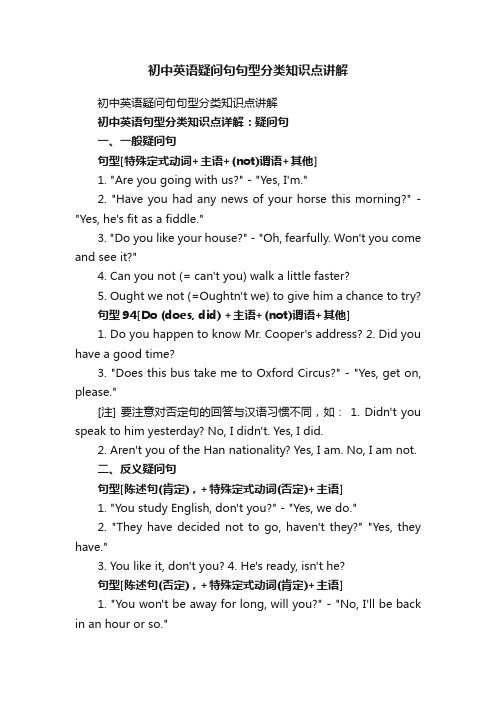
初中英语疑问句句型分类知识点讲解初中英语疑问句句型分类知识点讲解初中英语句型分类知识点详解:疑问句一、一般疑问句句型[特殊定式动词+主语+(not)谓语+其他]1. "Are you going with us?" - "Yes, I'm."2. "Have you had any news of your horse this morning?" - "Yes, he's fit as a fiddle."3. "Do you like your house?" - "Oh, fearfully. Won't you come and see it?"4. Can you not (= can't you) walk a little faster?5. Ought we not (=Oughtn't we) to give him a chance to try?句型94[Do (does, did) +主语+(not)谓语+其他]1. Do you happen to know Mr. Cooper's address?2. Did you have a good time?3. "Does this bus take me to Oxford Circus?" - "Yes, get on, please."[注] 要注意对否定句的回答与汉语习惯不同,如: 1. Didn't you speak to him yesterday? No, I didn't. Yes, I did.2. Aren't you of the Han nationality? Yes, I am. No, I am not.二、反义疑问句句型[陈述句(肯定),+特殊定式动词(否定)+主语]1. "You study English, don't you?" - "Yes, we do."2. "They have decided not to go, haven't they?" "Yes, they have."3. You like it, don't you?4. He's ready, isn't he?句型[陈述句(否定),+特殊定式动词(肯定)+主语]1. "You won't be away for long, will you?" - "No, I'll be back in an hour or so."2. "… I think I'll go into the green line. You couldn't give mea helping hand, could you, Mr. Snape?"3. "I'd like to go to Central Australia with you…. you h ave never been out of England, have you?"4. "He doesn't know anything about it, does he?" - "No, he doesn't.三、特指疑问句句型[疑问词(主语)+系词+表语]/ [疑问词(定语)+主语+行为动词+宾语]1. Who is there?2. Who gives your English lessons?3. What is in the box?4. Which is mine?5. Whose book is on the desk?6. How many students work in the workshop?7. What new products have been turned out in that factory?句型疑问词(表语/宾语/状语)+特殊定式动词+主语+行为动词…]1. Who is he?2. What is he?3. What is he like?4. What is it like?5. What kind of man is he?6. What day is today?7. What's the date today?8. What time is it now?9. How do you do?10. How are you getting along? (= how goes it with you? = how is life? = how is everything with you?11. How is your health? 12. How do you feel? 13. What's matter with you?14. Where are you going? 15. Where do you come from? 16. Where are you from?17. What's your nationality, please? 18. What family are you from?句型[疑问词+in the world/on earth/the devil/the deuce/ever等强调词语+其他]1. "What the deuce shall I write about?" - He thought.2. Whatin the world do you mean?3. Who on earth (in the world) told you that?4. Who the devil is he?5. What the deuce is the matter?6. What the dickens is it?7. Who ever wants this?四、选择疑问句句型[一般疑问句+or+一般疑问句]1. Shall we come to see you or will you come to see us?2. Are you from the South or from the North?3. Will he go on Monday or on Tuesday?4. Did you speak to them, or did the manager?5. Where's the bank? Should I go this way or that way?句型[特指疑问句,+A or B ?]1. "What would you like, Chinese or European food?" - "I don't mind one way or the other."2. Which would you rather have - steak or fish?3. Who will be your teacher, Mr. Brown or Mr. Cooper?4. Where did you spend your leave: in Shanghai or in Hangzhou?5. When will he go there, tomorrow or some other day?五、间接疑问句句型[适当的主语+疑问关联词+从句(正常语序)]1. I'd like to know how old you are.2. He inquired how it was done.3. "Guess how old I am." - "I'd say you're about twenty-three."4. I ask you what you want.5. Please advise me which book I should read first.6. Tell me why it is so important.句型[适当的`主语+if/whether+从句(正常语序)]1. I sometimes ask myself the question whether it was worththe effort.2. I ask you whether it is true or not.3. She asked if I had slept.4. Tell me whether you like it.5. He visited us next day and asked if we had got home safe.6. She inquired if he liked the post.六、双重疑问句句型一般疑问句+疑问关联词+从句(正常语序)]1. Can you tell me where he has gone?2. Have you any idea where he lives?3. May I ask you then what you would advise me to do?4. Do you know who lives here?5. Do you know when he was born?句型[疑问词+do you think/did you say/can you guess/do you suppose+其他(正常语序)]1. What will be the result, do you think?2. "How old were you then, Clyde, did you say?" "Between seventeen and eighteen."3. When do you think the meeting will be held?4. How many books, can you guess, did he buy the other day?5. What do you suppose he's hanging around here?七、修辞疑问句句型[陈述句(肯定)+反问句(肯定)]1. We're old friends, not strangers, right?2. So you've been abroad, have you?3. She's a sweet little girl, is she?4. The land reform has just reached the stage of deciding everyone's class status, so you come sucking around, do you?句型[疑问词+should+主语+动词原形+其他]1. Who should I see but my own brother?2. Who should there be?3. Why should the door be locked?4. Who/Whom should I see in the courtyard but Mr. Smith?5. "Where is Jane?" - "How should I know?"6. Why should he be angry with me?句型[Oh,/So+陈述句+反问句]1. Oh, he's here now, is he?2. Oh, you told him all about it, did you?3. So you've the luggage taken to the station, have you?4. So you're going abroad, are you?八、回响疑问句句型[A:陈述句+B:疑问句(重复A句中的部分)]1. A: I didn't like that meal. B: You didn't like it? (怀疑)2. "I'm tired." - "Are you?" (怀疑)3. A: The Browns are emigrating. B: Emigrating? (惊讶)4. A: It cost sixty dollars. B: How much did it cost? (惊讶)5. A: Switch the light off, please. B: Switch the light off, you say? / Switch what off? (反对)句型[A: 疑问句+B: 重述性疑问句]1. A: What do you think of the picture? B: What do I think of it? (怀疑)2. A: How did you enjoy the carnival? B: How did I enjoy what? (要求)3. A: How did you enjoy your holidays? B: How did I enjoy my holidays? (考虑回答)4. A: Have you borrowed my pen? B: (Have I) Borrowed your pen? (反驳)九、陈述式疑问句句型[任何陈述形式的疑问句(词序不变)]1. My friend's here?2. You wouldn't see me left here alone?3. "You followed us, then?" - "What's that to you? ..." saidJones, "Go to the devil!"4. A two million dollar building, you can't touch the walls?5. "You are not ill?" was the question put, "A little sick," replied Miss Keldar.句型[…疑问词(在剧中任何位置上)]1. "You use that position as a favorite to insult a gentleman." - "To insult a what?" said Steerforth.2. Five times what number makes twenty?3. I asked the carrier, "Are we going all the way there?" - "All the way where?" asked the carrier4. You're twenty-what (odd) this year?5. He's your who?6. Your who is a steel-worker?7. How old a child could draw this? 8. He is your son of what number?。
初中英语语法知识点讲解一般疑问句

初中英语语法知识点讲解一般疑问句一般疑问句是英语中常用的一种问句形式,用来提出对一些陈述句的疑问或询问事实、情况。
一般疑问句的特点是在句首使用助动词或情态动词来完成疑问句的构建。
以下是一般疑问句的常见知识点:1.助动词的使用:一般现在时:do / does一般过去时:did一般将来时:will现在进行时:am / is / are过去进行时:was / were例如:- Do you like pizza? (你喜欢披萨吗?)- Did she go to the party? (她去参加派对了吗?)- Will they visit their grandparents tomorrow? (他们明天会去拜访祖父母吗?)- Is he playing soccer now? (他现在在踢足球吗?)- Were you studying yesterday? (你昨天在学习吗?)2.情态动词的使用:can / could / may / might / must / should / would / shall / will例如:- Can you swim? (你会游泳吗?)- Should we go to the concert tonight? (我们今晚应该去听音乐会吗?)- Would you like some tea? (你想喝些茶吗?)- Must she finish her homework before going out? (她必须在出门前完成作业吗?)3.特殊疑问词的使用:在构建一般疑问句时,如果需要询问特定信息,常会使用特殊疑问词来引导。
常见的特殊疑问词有:what、where、when、why、how、who等。
例如:- Where is the post office? (邮局在哪里?)- When did they arrive at the airport? (他们什么时候到达机场的?)- Why are you crying? (你为什么哭?)- How do you get to school? (你怎么去学校的?)- Who is your favorite singer? (你最喜欢的歌手是谁?)。
初中英语 特殊疑问句

初中英语特殊疑问句1.___ classroom?2.What are they looking for?3.What are you doing now。
4.How many students are there over there?5.Can you speak English?6.Are you writing now?7.He has a desk and a chair.8.She is not buying any food in the supermarket.9.What is wrong with you?10.No。
___ growing flowers.11.What will you do with your classmates on Sunday?12.How beautifully the girl dances!13.The waiter and the waitress do not play table tennis every day.14.Is the boy standing on the man's shoulders?15.What time is it?4.There are twelve students over there。
(无错误)5.Can you speak English?6.Are you writing now?7.He has a desk and a chair.8.She is not buying any food in the supermarket.9.What is wrong with you?10.No。
___ growing flowers.11.What will you do with your classmates on Sunday?12.The waiter and the waitress do not play table tennis every day.13.Is the boy standing on the man's shoulders?14.What time is it?Why were you late。
初中英语一般疑问句和特殊疑问句

初中英语一般疑问句和特殊疑问句在英语学习中,一般疑问句和特殊疑问句是非常基础且重要的语法点,它们用于不同的交流情境中。
下面我会分别解释这两种句型的构成和使用方法,并提供一些例句。
一般疑问句一般疑问句用于询问事实或情况是否属实,通常期望对方用"Yes"或"No"来回答。
其构成是在陈述句的句首加上助动词、be动词或情态动词,并将句中的动词变回原形(如果有助动词或be动词,则保留原形)。
构成规则:1.如果句子中有be动词(am/is/are/was/were),则将be动词移到句首。
2.如果句子中有情态动词(can/could/may/might/will/would等),则将情态动词移到句首。
3.如果句子中没有上述两种动词,则根据时态选择相应的助动词do/does/did 放在句首。
例句:-陈述句:She is a student.-一般疑问句:Is she a student? (Yes, she is. / No, she isn't.)-陈述句:They can swim well.-一般疑问句:Can they swim well? (Yes, they can. / No, they can't.)-陈述句:You like coffee.-一般疑问句:Do you like coffee? (Yes, I do. / No, I don't.)特殊疑问句特殊疑问句用于询问具体的、特定的信息,句首使用特殊疑问词(what, who, where, when, why, how等)。
特殊疑问句的构成是特殊疑问词+一般疑问句的语序。
构成规则:1.特殊疑问词放在句首。
2.根据需要选择适当的助动词、be动词或情态动词,并调整语序,使其符合疑问句的结构。
例句:-Who is your favorite singer?-Where do you live?-When did you start learning English?-Why are you late today?-How do you usually go to school?通过掌握这些基本规则和例句,你可以更有效地在日常对话中使用一般疑问句和特殊疑问句。
初中英语-疑问句
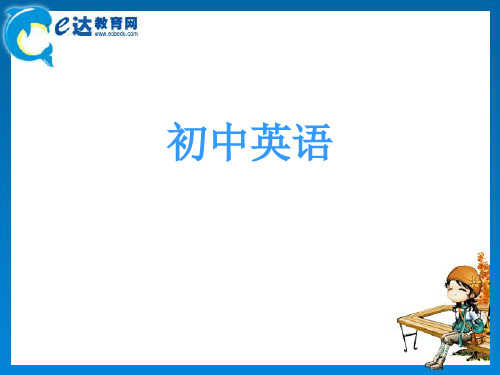
疑问句
一般疑问句
特殊疑问句
反意疑问句
一般疑问句
一般疑问句,即(yes/no)问句的改变:
1.把关键词(如:am、is、are、have、has、c称的转换。
2.有实意动词的句子改问句时,在句子开头加
“Do、Does”或“Did”,原实意动词用原型。
想想还缺了哪个疑问词呢?
1. I go to school by bus.
How do you go to school?
Let’s see the family of “how”
2. She is twelve.
How old is she?
3. Jim plays with his dog for about two hours on Sunday.
特殊疑问句
(Special question)
特殊疑问句的形式:疑问代词/副 词 + 动词 be/助动词/情态动词 + 主语 + 动词。疑问代词/副词包括 what, who, which, whom, whose, when, how, why, where 等。回 答时不用yes 或no,而要根据实际 情况回答。
1. I like English.
Do you like English?
2. Eddie played football.
Did Eddie play football?
一般疑问句的肯定回答、否定回答。
肯定回答:Yes,… +关键词。
否定回答:No,…+关键词+not.
1.Is she a pupil? Yes, she is. No, she is not./No, she isn`t. 2.Can you see a star? Yes, I can.
初中英语疑问句分类及应用知识点归纳
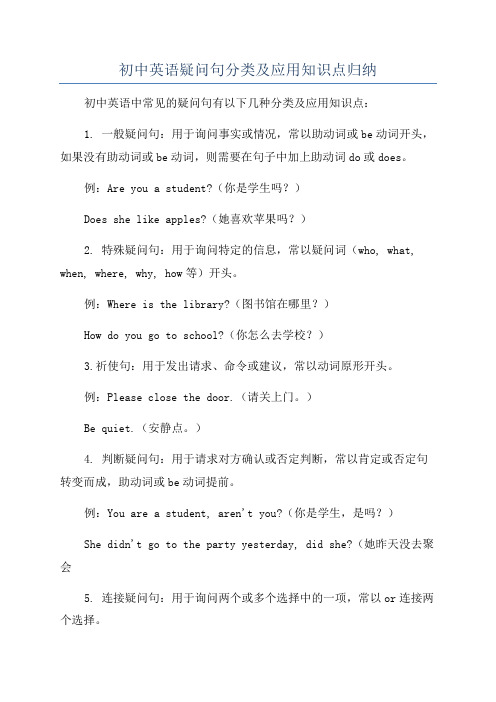
初中英语疑问句分类及应用知识点归纳初中英语中常见的疑问句有以下几种分类及应用知识点:
1. 一般疑问句:用于询问事实或情况,常以助动词或be动词开头,如果没有助动词或be动词,则需要在句子中加上助动词do或does。
例:Are you a student?(你是学生吗?)
Does she like apples?(她喜欢苹果吗?)
2. 特殊疑问句:用于询问特定的信息,常以疑问词(who, what, when, where, why, how等)开头。
例:Where is the library?(图书馆在哪里?)
How do you go to school?(你怎么去学校?)
3.祈使句:用于发出请求、命令或建议,常以动词原形开头。
例:Please close the door.(请关上门。
)
Be quiet.(安静点。
)
4. 判断疑问句:用于请求对方确认或否定判断,常以肯定或否定句转变而成,助动词或be动词提前。
例:You are a student, aren't you?(你是学生,是吗?)
She didn't go to the party yesterday, did she?(她昨天没去聚会
5. 连接疑问句:用于询问两个或多个选择中的一项,常以or连接两个选择。
例:Do you like apples or oranges?(你喜欢苹果还是橙子?)。
疑问句知识点详解(初中英语专项复习)4

疑问句知识点详解(初中英语专项复习)考向一:一般疑问句英语中的疑问句分为一般疑问句、特殊疑问句、选择疑问句和反意疑问句四种。
所谓一般疑问句,就是可以用yes或no来回答的疑问句。
1. 肯定形式的一般疑问句此类一般疑问句的结构为"连系动词be/助动词/情态动词+ 主语+ 动词原形+ 其他? "。
—Is he a good student? 他是一个好学生吗?—Yes, he is. 是的,他是。
/ No, he isn’t. 不,他不是。
—Does he go to school by bike? 他骑自行车去上学吗?—Yes, he does. 是的,他骑。
/ No, he doesn’t. 不,他不骑。
【典例】— Are there any notebooks on COVID-19 (新冠肺炎病毒) in your school?— _______. They tell us how to protect ourselves in this big event.A. Yes, they areB. Yes, there areC. Yes, there isD. Yes, it is【答案】B【解析】考查there be句型。
句意:——你们学校有新冠肺炎病毒的笔记本吗?——是的,有。
它们告诉我们在这个大事件中如何保护自己。
Are there…句式的答语:Yes, there are. /No, there aren’t. 故选B。
2. 否定形式的一般疑问句此类一般疑问句主要表示反问或惊讶,通常在连系动词be,情态动词或助动词后加not的缩略式n’t,并放在句首。
—Aren’t you a writer? 难道你不是作家吗?—No, I’m not. 是的,我不是。
【注意】在这样的句子中,要注意句子的翻译,yes翻译成"不",no翻译成"是的"。
【典例】—What a fine day!Let’s go for a picnic, _______ ?—Sounds like a good idea.A. shall weB. don’t weC. can we【答案】A【解析】考查反意疑问句。
- 1、下载文档前请自行甄别文档内容的完整性,平台不提供额外的编辑、内容补充、找答案等附加服务。
- 2、"仅部分预览"的文档,不可在线预览部分如存在完整性等问题,可反馈申请退款(可完整预览的文档不适用该条件!)。
- 3、如文档侵犯您的权益,请联系客服反馈,我们会尽快为您处理(人工客服工作时间:9:00-18:30)。
We use ‘wh-’ questions to ask for information about someone/something.
what----activity or thing which----thing or person who----person whose----possession when----time where----place why-----reason
“Because I missed the bus.” “因为我没赶 上公共汽车。”
4. Did Eddie play football?
Yes, he did. No, he did not./No, he didn`t.
特殊疑问句
(Special question)
特殊疑问句的形式:疑问代词/副 词 + 动词 be/助动词/情态动词 + 主语 + 动词。疑问代词/副词包括 what, who, which, whom, whose, when, how, why, where 等。回 答时不用yes 或no,而要根据实际 情况回答。
“你什么时候能完成作业?” “Tomorrow.” “明天。”
➢ where----Place (对地点提问) e.g “Where do you study?” “你在哪儿读书?”
“In Shanghai.” “在上海。”
➢ why-----reason (对原因提问) e.g “Why are you late?” “你为什么迟到?”
➢ what----Activity or thing (对行为和事物提问)。
e.g . 1. “What are you talking about?” “你们在谈什么?” “We are talking about our family.” “我们在谈论我
们 的家庭情况。”
2. “What is your name?” “你叫什么名字?” “My name is Wang Li.” “我叫王丽。”
➢ which----Thing or person (对特定的人或事物提问)。
e.g “Which man is your Enn in white.” “那个穿着白衣服的。”
➢ who----Person (对人提问)
e.g “Who will visit you tomorrow?” “My father.” “明天谁来看你?” “我爸爸。”
I am reading. I’d like this red one. He is our teacher. The bag is mine. My birthday is on 2nd May. My pen is in the pencil case. I like dancing because it is fun.
that time?
• Mum: It’s very cold.
• Millie: W__h_e_re_are we going to stay in Harbin?
• Mum: In Grandma’s big house.
• Millie: _W_h_a_t_does Grandma like eating?
➢ whose----Possession (对人的所有关系提问) e.g “Whose book is this?” “It is my brother’s.”
“这是谁的书?” “是我弟弟的。” ➢ when----Time (对时间提问) e.g “When will you finish your homework?”
1.Is she a pupil? Yes, she is. No, she is not./No, she isn`t.
2.Can you see a star?
Yes, I can. No, I can not./No, I can`t.
3. Do you like English.
Yes, I do. No, I do not./No, I don`t.
• Mum: She likes biscuits very much.
• Millie: _W__h_y _do we need that big bag?
• Mum: Because we need to take lots of things
to Harbin.
B Asking ‘wh-’ questions
Will it rain this afternoon?
1. I like English. Do you like English?
2. Eddie played football. Did Eddie play football?
一般疑问句的肯定回答、否定回答。
肯定回答:Yes,… +关键词。 否定回答:No,…+关键词+not.
初中英语
一般疑问句 特殊疑问句 反意疑问句
一般疑问句
一般疑问句,即(yes/no)问句的改变: 1.把关键词(如:am、is、are、have、has、can、
will等)放在句子的开头,句尾改为“?”但要 注意一、二人称的转换。 2.有实意动词的句子改问句时,在句子开头加 “Do、Does”或“Did”,原实意动词用原型。
Try to complete the dialogue
• Millie: _W__h_e_n_are we going to Harbin?
• Mum: On 10th February.
• Millie: _W__h_at__ is the weather like in Harbin at
•
1.She is a pupil. Is she a pupil?
2. 她 是 学生。 是 她 学生 ?
2. I can see a star. Can you see a star?
3. My mother is a teacher.
Is your mother a teacher? 4. It will rain this afternoon.
